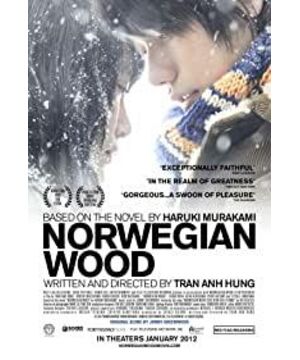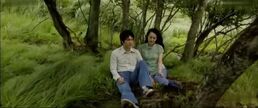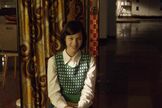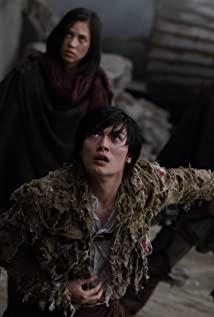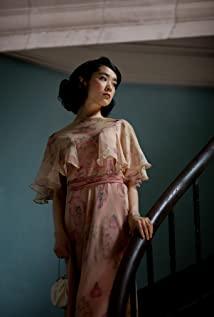A novel adapted into a movie is not necessarily worse than the original. For example, "Love of the Hawthorn Tree", the original work is only third-rate, and it has been improved a lot by Zhang Yimou. However, "Norwegian Forest" is the other way around. Originally, Vietnamese director Chen Yingying was not in the sequence of world-class directors. Even if the original movies ("Tricycle Driver", "The Smell of Green Papaya") were appreciated by Murakami Haruki, his talent was difficult to match Murakami.
Some people may say that this film is beautifully shot, the composition is exquisite, the colors are soft and fresh, the large green color touches the hearts of the viewers, the hero and heroine are beautiful and sad... They are just forms, the essence of Murakami is just these furs .
Although Chen Yingxiong has been faithful to the original work, retaining the clues and characters of the original work, and expressing the "beauty of pain" in the novel in a soothing image style, he has not been able to express the beautiful words of Haruki Murakami. , details and artistic conception are visualized, and the young people's thinking about life and death, the pursuit of the true meaning of life, the exploration of the meaning of existence through sex, and the honesty of self and love in the original novel are beautiful and thought-provoking. .
There are at least 15 differences between the movie and the novel, the only one that is more desirable is the treatment of the movie's opening. The novel is told in the first person, starting with the scene of "I" (Watanabe) landing at the Hamburg airport, and then I am immersed in the memory of the past. Chen Yingying resets the story and sets the opening as the moment when the three important characters in the film (Watanabe, Naoko, and Kiyuki) blend together, especially the eternal love between Naoko and Kiyuki is described as youthful and wanton, but the trauma is immediate. When the attack comes, Muyue's suicide breaks everything. Choosing such a narrative method, Chen Yingxiong admits, "I want to recreate the pain of a fresh wound. This is also the biggest reason for writing the script in the present tense. It is very difficult to make this decision."
It is a little bright spot to start a tangled film in this way, which reminds the viewer of some iconic bridges of the French New Wave period, such as the "Three Walks" in "Jules and Jim", but the good times did not last long, when Watanabe After the encounter with Naoko, the narrative starts to get muddled. How Naoko occupied Watanabe's heart little by little, lack of progress.
Chen Yingying grew up in Vietnam, studied in France, and has an unforgettable nostalgia for Vietnam. In Japan in "Norwegian Forest", he was dressed in a vivid Vietnamese color, green, wind, rain, and the costumes of the characters in the film... …infused the tropical spirit into the peaceful Japanese wind, but seemed unaccustomed to the soil.
The most regrettable thing is Chen Yingxiong's choice between Naoko and Midori. Rinko Kikuchi, who plays Naoko, has a wide face and a disproportionate age, which is far from Naoko's 20-year-old body, while Midori, who is popular, plays the role. Come occasionally contrived, and her clues become inexplicable because of the cuts. Especially, after her father passed away, still saying to Watanabe on the phone, "You're going to take me to a porn movie" is unbearable. This detail is mentioned in the novel after Midori took Watanabe to visit his dying father, in order to adjust the sad atmosphere. A girl under the age of 20 whose father has just passed away, no matter what kind of sexual endowment she has, should not say such a thing! Midori blamed Watanabe's detachment towards him because he had an incestuous relationship. In her imagination, Watanabe sometimes seemed to have a heavy heart because he was with a married woman. This kind of imagination disappears in the movie. This is a girl's imagination about an imaginary rival, and it also represents her understanding of this man. But, unfortunately, none of these. So at the end of the movie, when Naoko passed away and Watanabe and Reiko slept, they called Midori and said "I love you", how unconvincing. Moreover, the three words "I love you" are not mentioned at the end of the book.
Speaking of Reiko, it is also very interesting. She is not a professional rehabilitation teacher, but she has been helping Naoko out of her inner haze since then. She has an unspeakable past, being tortured by a 13-year-old girl to the point of exhaustion both physically and mentally, and her husband is separated. She slept with Watanabe, a farewell to the past, and it was also equivalent to her performing such a ritual on behalf of Naoko. In the book, it was written, "Reiko 'Watanabe, do that with me,' after playing, Reiko whispered. 'Unbelievable.' I said. 'I was thinking the same thing." Watanabe twice confirmed with Reiko seriously, "Are you serious?" The sense of ritual and the tacit understanding between the two sides are gone. The important thing is that sex is a way to explore life in this novel. effect is weakened.
Adaptation is a struggle between two authors. If one of them is not strong enough, he will get lost. Like Watanabe, he will ask, "Where am I?" Director Chen Yingxiong, do you know where "Norwegian Wood" is? Was it Japan in the late 1960s, or Vietnam at some point?
View more about Norwegian Wood reviews


